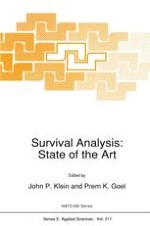1992 | OriginalPaper | Buchkapitel
Independent Delayed Entry
verfasst von : Niels Keiding, Melvin Moeschberger
Erschienen in: Survival Analysis: State of the Art
Verlag: Springer Netherlands
Enthalten in: Professional Book Archive
Aktivieren Sie unsere intelligente Suche, um passende Fachinhalte oder Patente zu finden.
Wählen Sie Textabschnitte aus um mit Künstlicher Intelligenz passenden Patente zu finden. powered by
Markieren Sie Textabschnitte, um KI-gestützt weitere passende Inhalte zu finden. powered by
Interest in analysis of survival data with delayed entry has picked up in recent years, the emphasis being put on generalizing the well-established non-and semiparametric survival analysis methodology. This paper attempts to survey this work, highlighting the concepts of truncation (complete observation of a conditional distribution) and filtering (incomplete observation of the original distribution, generalizing censoring) and their respective strengths and weaknesses in describing delayed entry.Attention is also paid to the conceptual and empirical impact of the assumption of independent truncation or filtering. An important class of situations where delayed entry may not be independent occurs when populations are heterogeneous in ways not accounted for in the modelling.A particular problem arises in the study of mortality of patients suffering from some chronic disease, where study entry is from a cross-sectional sample of prevalent cases (a prevalent cohort study). Patients with longer disease durations are more likely to be included in the sample, and special care is needed to avoid biased estimates of survival distributions.
